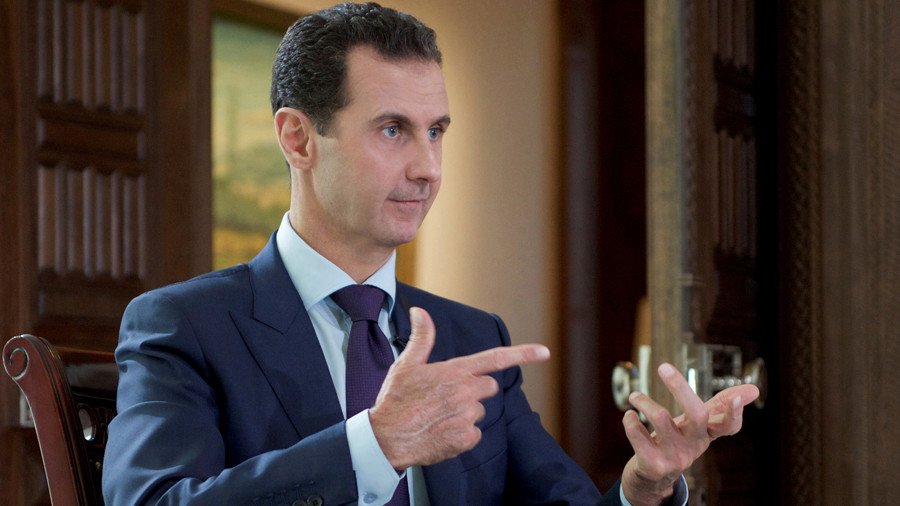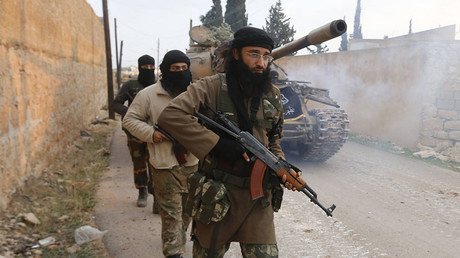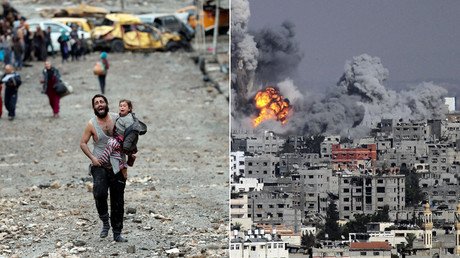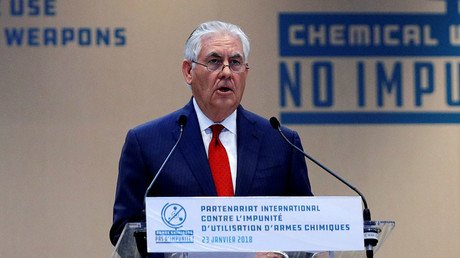Welcome to another Western edition of anti-Assad political theater, now in Ghouta

Western media is heaping scorn on Syria for using ‘excessive force’ in its effort to liberate Ghouta from militant control. But where was that same concern when Mosul was being pulverized by US-led forces?
The Syrian government’s liberation efforts in the Damascus suburb of Eastern Ghouta have deteriorated into a media circus where truth has taken a back seat in the clown car. As was the case in the liberation of Aleppo, the government of President Bashar Assad – as opposed to the militant groups wreaking havoc in his country – has borne the main brunt of criticism from the Western world.
Due to the conditions on the ground in Ghouta, it is virtually impossible to get a clear picture of the situation there. What we do know, however, is that Damascus is being hit by approximately 70 missiles daily from militant positions inside Ghouta. The Western media would rather ignore that fact, speculating instead that “more than 500 people” have been killed by the Assad “regime” since efforts to retake the city began last month.
So where does the Western media get its information? In the majority of cases, from the Syrian Observatory for Human Rights (SOHR), a one-man operation based out of a humble abode in Coventry, UK. Western reporters also rely on the so-called White Helmets, the very same ‘humanitarian’ group that is suspected of working in tandem with terrorist groups that are carrying out attacks on civilians. Based on these extremely dubious sources, and others, one of the UK’s most respectable newspapers, the Guardian, was bold enough to assert that “Eastern Ghouta is turning into Syria’s Srebrenica.”
“Like the Bosnian Muslim enclave in 1995, eastern Ghouta … has been besieged by regime forces since the early stages of the Syrian war,” Simon Tisdall wrote. “As in Bosnia, nobody attempted to protect the civilian population when a regime offensive began there in December after negotiations failed. The airstrikes and bombardments… are carried out with impunity by Syrian forces and their Russian backers.”
I read that article twice in the hope of finding any mention of the militant forces that have been occupying Eastern Ghouta off and on since late 2012, subjecting the local population to untold horrors, including the threat of chemical attack. Regrettably, I failed; not a single mention of the terrorists. Indeed, to read Tisdall’s article one gets the impression that the citizens of Ghouta are perfectly content with the occupation of their city by fanatical militants.
Examples of such biased attitudes towards the Syrian government have, at the same time, overtaken the social media jungle like the invasive kudzu vine, blocking out the light of truth.
This week, for example, a US-based user who goes by the name of Sami Sharbek posted two photos on his Twitter account – one showing a building consumed by an explosion; the other depicting a man carrying a crying child.
“This is not a movie. This is Syria,” he wrote in the caption.
Sharbek was only 50 percent right.
Although the photos were not taken from a Hollywood blockbuster film, they did feature horrific images from Gaza and Mosul, respectively. In other words, very far from the action in Ghouta. Although Sharbek later admitted to his error, the damage was already done. As of February 28, the Tweet had made a huge impression, generating over 125,000 shares and 154,000 likes (the account is now blocked, open only to “approved followers”), possibly reaching millions of users. It is probably safe to say that very few of those same people will hear that Sharbek’s tweet was for all intents and purposes fake news.
On February 25, Danny Gold, a writer and correspondent, compared the situation in Ghouta to one of history’s worst human atrocities when he tweeted: “I know how Jews who lived through the holocaust felt 70 years later about the world turning a blind eye, can't imagine how Syrians in Ghouta will feel about their suffering being so well-documented as it's happening yet doubted by so many.”
I know how Jews who lived through the holocaust felt 70 years later about the world turning a blind eye, can't imagine how Syrians in Ghouta will feel about their suffering being so well-documented as it's happening yet doubted by so many.
— Danny Gold (@DGisSERIOUS) February 25, 2018
Dan Cohen, a correspondent with RT America, responded to Gold: “Ghouta is like the Holocaust but Mosul was ‘a huge journalism event’ in which US-led forces took ‘much care’ in burying at least 3,200 civilians in the rubble.”
Cohen’s comment was a jibe at a tweet Gold had sent on February 1, 2017 in which he embellished the historical record of the US-led Iraqi campaign, remarking: “Mosul was a huge journalism event. Everyone who covers the Middle East was there.”
Ghouta is like the Holocaust but Mosul was “a huge journalism event” in which US-led forces took “much care” in burying at least 3,200 civilians in the rubble. pic.twitter.com/SxQGxFhYlc
— Dan Cohen (@dancohen3000) February 26, 2018
But if Mosul really was one big happy media confab, then how was it possible for the fatality figures to have been so skewed? As AP rather belatedly reported in December 2017, long after the nine-month conflict had ended, “The price Mosul’s residents paid in blood to see their city freed was between 9,000 and 11,000 dead … a civilian casualty rate nearly 10 times higher than what has been previously reported.”
Perhaps if Western reporters had not spent so much of their time reporting on the same type of military operation in Aleppo, which was then the focus of a Russian-backed liberation campaign, they may have more accurately described the situation in Iraq’s second-largest city.
Michael Raddie, co-editor of BSNews, provided a convincing explanation for the discrepancy in the way the Western media reports on war zones, which he said can be reduced to a matter of “worthy victims” and “unworthy victims.”
“The victims of US bombs and British airstrikes are not worthy because we don’t do that kind of thing,” Raddie told RT. “Our killing of civilians is a mistake, collateral damage. The Syrian air force killing of civilians … that is atrocities. And that is the ideology that Western media portray all the time.”
You're Being Lied To On East Ghouta https://t.co/ciZK6QY9Ko via @YouTube
— vanessa beeley (@VanessaBeeley) February 22, 2018
However, there is another side to this wave of Western cynicism with regards to Syria that could spark a real catastrophe. That involves the threat of a chemical strike, which the West seems to believe is something only the “Assad regime” is capable of committing. After all, who would ever suspect bona-fide terrorists deprived of modern weapons of resorting to such barbaric means of warfare?
Much like Barack Obama’s utterly reckless “red line” warning regarding the use of chemical weapons, which he said would warrant US military action, French President Emmanuel Macron issued the very same foolish warning on February 14.
"On chemical weapons, I set a red line and I reaffirm that red line," Macron told reporters. "If we have proven evidence that chemical weapons proscribed in treaties are used, we will strike the place where they are made."
Did it surprise anyone that less than two weeks after Macron’s warning a chemical attack – conveniently supported by photos provided by, yes, the White Helmets – was reported to have occurred in Ghouta? Western media and politicians have actually suggested a Russian connection to the event.
“Whoever conducted the attacks, Russia ultimately bears responsibility for the victims in Eastern Ghouta and countless other Syrians targeted with chemical weapons since Russia became involved in Syria,” US Secretary of State Rex Tillerson said.
Presently, a 30-day ceasefire endorsed by the UN Security Council is in effect across Syria, as well as a daily five-hour “humanitarian pause” in Eastern Ghouta enforced by Russia.
Yet thus far the plan is not producing the desired effect. Militants are preventing civilians from fleeing besieged Eastern Ghouta and are sabotaging the humanitarian operation there, Major General Vladimir Zolotukhin, a spokesman for the Russian Center for Reconciliation in Syria, told journalists on Thursday.
The statements, views and opinions expressed in this column are solely those of the author and do not necessarily represent those of RT.
















